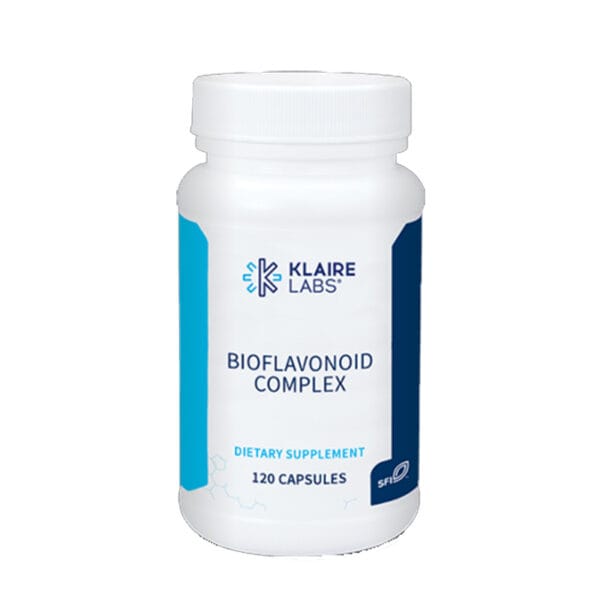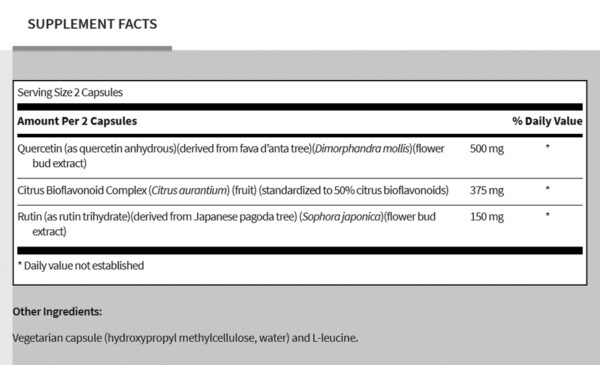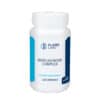Bioflavonoid Complex (120 Capsules)
Plant-derived antioxidants to support healthy blood vessels and promote cardiovascular health.†
This formula is designed to contribute to the maintenance of healthy blood vessels and provides a balanced mix of select bioflavonoids including a standardized extract of quercetin.†
$29.99
Description
Bioflavonoids, or flavonoids, are a large class of powerful phytochemicals. Not only are bioflavonoids impressive in and of themselves, but they also help maximize the benefits of vitamin C by inhibiting its breakdown in the body. The great thing is that bioflavonoids are often found in many of the top vitamin C foods.
What do broccoli, kale, red onions, hot peppers, rutabaga, spinach and watercress have in common? They’re all vegetables that top the charts, specifically the USDA Flavonoid Database, for their high bioflavonoid content. As such, you should consume these bioflavonoid foods because they’ve been shown to have antiviral, anti-allergy, anti-inflammatory and antitumor abilities.
What Are Bioflavonoids?
Bioflavonoids — aka flavonoids or “vitamin P” — naturally occur in pretty much all fruits, vegetables and herbs. Chocolate, tea and wine, as well as some dry beans and seeds, also contain vitamin P. Flavonoids are a large family of over 5,000 hydroxylated polyphenolic compounds that carry out key functions in plants, such as attracting pollinating insects, fighting environmental stresses and modulating cell growth. In humans, their bioavailability and biological activities appear to be strongly influenced by their chemical nature.
Bioflavonoids can be broken down into several categories. Although dividing them into categories is not universally agreed upon, one common breakdown includes isoflavones, anthocyanidins, flavans, flavonols, flavones and flavanones. Some of the best-known flavonoids, like the quercetin found in onions and the genistein found in soy, can be considered subcategories of categories. Flavonoids also include rutin, citrus flavonoids and hesperidin.
In general, the more colorful a food item is, the richer it is in flavonoids. The ability of flavonoids to positively impact the human body in a large variety of ways appears to be related to their ability to regulate cell signaling. Flavonoids have been shown to exhibit anti-inflammatory, antithrombogenic, antidiabetic, anticancer and neuroprotective activities.
Benefits
1. Varicose Veins
Varicose veins occur more commonly in women than men, but up to 60 percent of people in the U.S. have this common health concern. They develop when your veins stretch and their valves, which stop blood from flowing backward, don’t work properly anymore, allowing flood to flow backward and pool in your veins. The good news is that you can fight varicose veins with a healthy diet.
Rutin is a type of bioflavonoid that may support the walls of your veins and help them work better. A number of studies have shown that flavonoids that come from rutin relieve swelling, aching and pain from varicose veins. Rutin is found in fruits and fruit rinds (especially citrus fruits), buckwheat and asparagus.
Additionally, oligomeric proanthocyandin complexes (OPCs) may decrease vein leakage and swelling in the legs. OPCs are bioflavonoids found in grapeseed and pine bark. Similar flavonoids are also found in cranberry, hawthorn, blueberry and other plants.
2. Hemorrhoids
Up to 75 percent of people experience hemorrhoids at some point in their lives. Hemorrhoids are caused by an increase in pressure on the veins of the anus and rectum. They can be very uncomfortable or even painful, but bioflavonoids are a natural way to prevent and heal unpleasant hemorrhoids.
Studies have shown that bioflavonoids can improve microcirculation, capillary flow and vascular tone, all of which are key in the natural treatment of hemorrhoids. Bioflavonoid consumption can help you avoid the lengthy and possibly expensive complications of hemorrhoids.
3. Cardiovascular Health
Several prospective cohort studies conducted in Europe and the U.S. have examined the relationship between some measure of dietary flavonoid intake and cardiovascular disease.
A recent meta-analysis of 14 prospective studies published between 1996 and 2012 reported that higher intakes in each flavonoid subclass were significantly associated with a reduced risk of cardiovascular issues.
4. Hepatitis
Hepatitis is a disease characterized by inflammation of the liver. The flavonoid catechin (found in high amounts in matcha green tea) has been shown in some studies to help people suffering from acute viral hepatitis as well as chronic hepatitis. A typical amount of catechin used in successful trials is 500 to 750 milligrams three times per day.
5. Bruises
Bruises to the body occur when blood vessels break, due to some kind of force, and leak blood into areas under the skin. The main symptoms of a bruise are skin pain, skin discoloration and swelling.
Bioflavonoids are often recommended along with vitamin C for people who bruise easily. Bioflavonoids help strengthen the capillaries, which makes them helpful for healing bruises. Bioflavonoids, especially citrus flavonoids, may also increase the effectiveness of vitamin C.
Suggested Use: 2 capsules, 1 to 2 times daily with food or as directed by a healthcare professional.
Allergy Statement
Free of the following common allergens: milk/casein, eggs, fish, shellfish, tree nuts, peanuts, wheat, and soybeans. Contains no artificial colors, flavors, or preservatives.
Caution: If you are pregnant, nursing, have a medical condition, or taking prescription drugs, consult your physician before using this product. KEEP OUT OF REACH OF CHILDREN.
† These statements have not been evaluated by the Food and Drug Administration. These products are not intended to diagnose, treat, cure, or prevent any disease.




